2. 温州医科大学附属第一医院外科, 温州 325000
2. Department of Surgery, The First Affiliated Hospital of Wenzhou Medical University, Wenzhou 325000, Zhejiang, China
幽门螺杆菌(Helicobacter pylori,Hp)是上消化道疾病中一种常见的革兰阴性菌。研究数据表明,大约50%发达国家的成年人和90%发展中国家的成年人血液中都能检测到抗Hp的抗体[1]。Hp感染与慢性胃炎、消化性溃疡、胃癌等密切相关,大约95%的十二指肠溃疡和80%的胃溃疡患者都存在Hp感染,并且统计数据发现,根除Hp能明显降低溃疡的发生率[2]。
流行病学研究已经证实O血型的人口比例在胃溃疡患者中极高,而Hp作为溃疡性疾病的主要病因之一,其在人群中的易感性与ABO血型的关系仍然存在许多争议[3-9]。Borén等[3]发现存在于胃黏膜上皮细胞表面的刘易斯血型系统中的Leb抗原是Hp的受体,而Leb抗原作为一种低聚糖,在O血型的人群中大量表达。因此一些学者认为O血型的人群和Hp感染存在较强关联[3-6]。然而,也有研究发现A血型也和Hp感染相关[7];同时Kanbay等[8]发现Hp感染与O、A血型均相关,而与AB血型无关。另外,还有研究并未完全揭示ABO血型和Hp感染之间的关系[1]。虽然如此,一篇来自伊朗的文献仍指出ABO血型对Hp感染率有着一种非常特殊的影响[9]。
目前有关ABO血型与Hp感染相关性的研究很多,但其研究结果并不一致,缺乏多中心、大样本的实验数据证实二者之间的确切关系。因此,本研究旨在对国内外已发表的ABO血型与Hp感染的相关研究进行系统全面的meta分析,进而为Hp感染的病因学及临床决策提供更为准确、可靠的循证医学依据。
1 资料和方法 1.1 检索策略针对PubMed、EMBASE以及CNKI等数据库,以“ABO血型”“幽门螺杆菌”为中文检索词,以“ABO blood group system”“Helicobacter pylori”“H. pylori”为英文检索词,广泛综合地检索从1966年8月至2016年1月公开发表的文献。同时,手检相关文献的参考文献和引文,文献语种不限。为避免文献遗漏,检索由2名研究者独立完成。
1.2 纳入与排除标准纳入标准:(1)文献研究内容涉及ABO血型与Hp感染的关系;(2)能提供病例组和对照组的具体人数及两组人群的Hp感染率。排除标准:(1)重复发表的研究、会议文献、综述、动物实验研究等;(2)无法获得全文或无法提供有效数据的研究;(3)无对照组的文献。文献纳入与排除由2名研究者独立评阅,若存在异议或疑问时与第3名研究者商讨后确定。
1.3 资料提取数据提取和质量评价由2名研究者独立完成,若不能达成统一意见则与第3名研究者讨论后决定。仔细阅读纳入文献,采用标准方法,将基本信息从每篇合格的文献中提取出来。主要信息如下:第一作者、发表年份、国家以及不同血型人群中病例组和对照组的人数。
1.4 统计学处理采用Review Manager 5.0和Stata 11.0软件进行meta分析。首先通过I2检验对同类研究间的异质性进行评价[10-11],若I2≤50%,说明研究间存在的异质性较小,使用固定效应模型;若I2 > 50%,说明研究间的异质性较大,使用随机效应模型[10],并对其异质性来源进行分析,根据可能出现的异质性因素进行亚组分析,采用敏感性分析检验结果的稳定性。采用比值比(OR)作为评价ABO血型和Hp感染关系的效应量,所有分析均计算95%置信区间(95%CI)。通过定义协变量进行meta回归分析,评估各协变量对异质性的影响。通过绘制漏斗图观察是否存在发表偏倚,同时采用Egger检验法对发表偏倚进行定量检测,若P > 0.05则说明不存在发表偏倚[12-13]。
2 结果 2.1 检索结果和基本特征根据检索策略,排除重复文献,共检索出文献322篇。经纳入和排除标准检验后,最终纳入文献31篇[1, 7-9, 14-40],文献检索流程和结果见图 1。31篇文献的发表时间为1991至2014年,包含18篇横断面研究、7篇队列研究及6篇病例对照研究;4篇中文和27篇英文文献;19篇研究来自亚洲,8篇来自欧洲,2篇来自非洲,各有1篇分别来自美洲和大洋洲;16篇研究对象来自于志愿者,其余15篇来自于住院患者。这些研究共纳入Hp感染阳性者6 759例和Hp感染阴性者9 020例。纳入文献的基本信息见表 1。
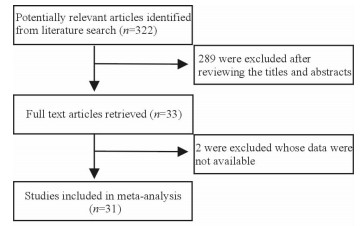
|
图 1 文献筛选流程图 Fig 1 Schematic presentation of study selection process |
|
|
表 1 纳入文献的基本信息 Tab 1 Description of studies included in meta-analysis |
2.2 综合分析
将所有纳入文献合并统计量后,我们发现各研究间均存在明显的异质性, 因此采用随机效应模型合并分析。为了检测分析结果的稳定性,通过每次不断地剔除掉1篇研究并将剩余的研究重新合并进行敏感性分析。当剔除掉Lin等[31]的研究后,合并结果明显改变,因此将此篇剔除。
在剔除掉Lin等[31]的研究后,我们重新合并了OR值,发现在正常人群与Hp感染人群中血型分布差异无统计学意义(血型A:OR=0.98, 95%CI 0.84~1.15, P=0.82;血型B:OR=0.93, 95%CI 0.84~1.03, P=0.15;血型O:OR=1.10, 95%CI 0.93~1.29, P=0.26;血型AB:OR=0.84,95%CI 0.67~1.06, P=0.14),说明ABO血型与Hp感染发生无关。见图 2~5。
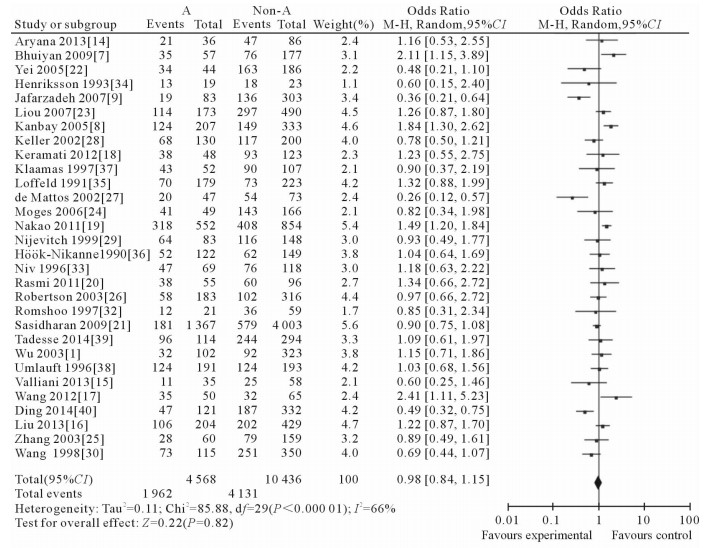
|
图 2 A血型与Hp感染发生风险的森林图 Fig 2 Forest plot of association between blood group A and Helicobacter pylori infection |
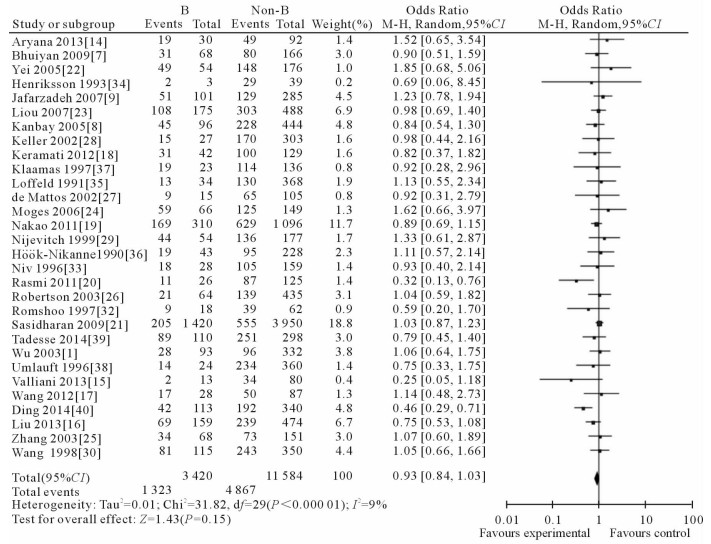
|
图 3 B血型与Hp感染发生风险的森林图 Fig 3 Forest plot of association between blood group B and Helicobacter pylori infection |

|
图 4 O血型与Hp感染发生风险的森林图 Fig 4 Forest plot of association between blood group O and Helicobacter pylori infection |
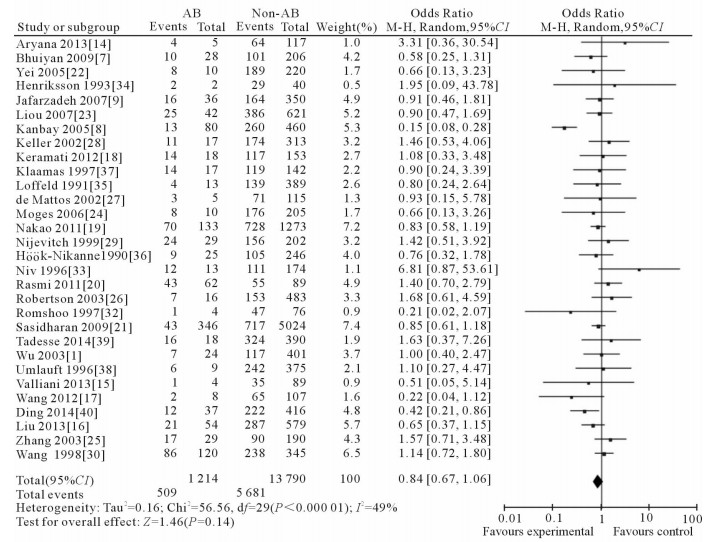
|
图 5 AB血型与Hp感染发生风险的森林图 Fig 5 Forest plot of association between blood group AB and Helicobacter pylori infection |
2.3 亚组分析
鉴于综合分析的高异质性,我们以研究对象来源及人群地理分布作为协变量进行亚组分析。31项研究中研究对象来源于住院患者的有15项,来源于志愿者的有16项,两亚组分析结果并未显示ABO血型与Hp感染发生有明显的关系,因此研究对象的不同并不是高异质性的来源。纳入研究中19篇研究人群来自于亚洲,7篇来自于欧洲,2篇来自于非洲,而来自美洲、大洋洲的各有1篇,分析结果表明,在亚洲亚组和欧洲亚组中ABO血型与Hp感染发生均不存在明显关系。
2.4 Meta回归分析尽管剔除了Lin等[31]的研究,但A、O及AB血型组的结果仍显示存在明显的异质性。为了探究高异质性的来源,我们分别以研究出版年份、对照组的来源以及ABO血型比例分布作为协变量进行meta回归分析。结果发现,在AB血型中,对照组来源(Coef.=-0.360,P=0.004)与ABO血型比例分布(Coef.=-0.163,P=0.007)均是明显异质性的来源。Meta回归分析结果见表 2。
|
|
表 2 Meta回归分析结果 Tab 2 Results of meta regression analysis |
2.5 发表偏倚分析
排除Lin等[31]的研究后,采用漏斗图、Egger法检测发表偏倚。Egger法检测P值均 > 0.05,表明不存在明显的发表偏倚。然而漏斗图明显不对称,提示存在潜在的发表偏倚(图 6)。
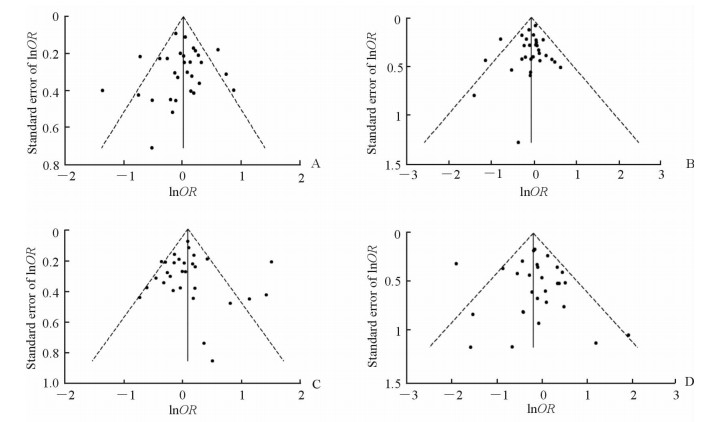
|
图 6 发表偏倚的检测漏斗图 Fig 6 Publication bias was evaluated using funnel plots |
3 讨论
Hp在胃溃疡、胃癌等消化道疾病中扮演着非常重要的角色。鉴于ABO血型系统与Hp感染发生相关性的研究由来已久而结果又缺乏一致性,我们开展了本次的meta分析。
针对31篇已发表的研究,我们对ABO血型与Hp感染发生关系进行了系统的meta分析,结果表明ABO血型系统与Hp感染发生无关。首次合并效应量时,我们发现研究中存在明显的异质性,尽管我们采用了随机效应模型来合并效应量,高异质性的情况仍然存在。此后,敏感性分析结果发现Lin等[31]的研究是明显异质性的来源之一。在剔除了Lin等[31]的研究后,我们重新计算了合并OR值,结果提示ABO血型系统与Hp感染发生不存在明显关系,这一结果和其他一些学者的研究结果一致[37-38]。在限制了地域、对象来源作为协变量后,我们进行了亚组分析,结果表明Hp感染与非感染组之间ABO血型分布差异无统计学意义。为了探究造成高异质性的因素,我们以研究出版年份、对照组的来源以及ABO血型比例分布作为协变量进行了meta回归分析。单变量的meta回归分析结果提示对照组来源以及样本中ABO血型比例分布明显影响了异质性。采用Egger法并未检测到明显的发表偏倚。
本研究结果与先前一些报道O血型更易感染Hp的研究[3, 27, 34]并不一致。Borén等[3-4]研究发现,存在于胃黏膜上皮细胞表面的刘易斯血型系统中的Leb抗原是Hp的受体,介导了Hp进入黏膜内的转运。他们认为O血型的人群更倾向于感染Hp,因为他们体内存在着更多Hp受体。实际上,相关研究数据表明,由于BabA基因序列的多样性,来自于世界各地的不同Hp菌株对O抗原的亲和力存在着将近1 500倍的差异。因此,并不是所有的菌株都对O抗原和Leb抗原具有特异性。Aspholm-Hurting等[41]认为超过95%的黏附菌株能够结合A、B以及O抗原,而来自南美洲印第安人身上的黏附菌株则更倾向于结合O抗原。Con等[42]分别对95例哥斯达黎加患者和95例日本患者的Hp菌株进行基因型分型,发现后者的BabA2基因型频率(96.8%)比前者(73.7%)高,而BabA2/B基因型频率(1.1%)比前者(11.6%)低,因此他们指出Hp基因组中BabA2和BabA2/B基因型频率存在着地域上的差异。事实上, Borén等[3-4]的研究只采用了来源于南美洲的P400菌株, 这并不能说明所有菌株都符合他们的研究结果,因而其分析结果并不可信。
尽管我们进行了仔细的文献检索,采用明确的纳入和排除标准筛选文献,同时还进行了准确的数据提取和meta分析,但是缺陷在所难免。本研究的局限性在于:(1)由于本研究仅针对已发表而并未采用未发表但仍可行的文献,因此可能有潜在的发表偏倚存在;(2)尽管我们采用了准确的检索方法去获取相关文献,但仍有些许符合标准的文献未被纳入;(3)纳入的部分文献信息不全,不能从中获取更多有效信息。
综上所述,本研究结果显示,ABO血型系统与Hp感染发生不具有相关性,亚组分析也显示在Hp感染和非感染组中ABO血型分布差异无统计学意义。Hp感染的发生与性别、年龄、营养状况等多种因素相关,而本研究所纳入分析的文献并未将所有可能混杂因素全部控制排除,故需要有更多大样本量的研究来进一步证实ABO血型系统与Hp感染发生的关系。
| [1] | WU T Z, CHEN L K, HWANG S J. Seroprevalence of Helicobacter pylori in school-aged Chinese in Taipei City and relationship between ABO blood groups[J]. World J Gastroenterol, 2003, 9: 1752–1755. DOI: 10.3748/wjg.v9.i8.1752 |
| [2] | PARSONNET J, FRIEDMAN G D, VANDERSTEEN D P, CHANG Y, VOGELMAN J H, ORENTREICH N, et al. Helicobacter pylori infection and the risk of gastric carcinoma[J]. New Engl J Med, 2014, 325: 1127–1131. |
| [3] | BORÉN T, FALK P, ROTH K A, LARSON G, NORMARK S. Attachment of Helicobacter pylori to human gastric epithelium mediated by blood group antigens[J]. Science, 1993, 262: 1892–1895. DOI: 10.1126/science.8018146 |
| [4] | BORÉN T, NORMARK S, FALK P. Helicobacter pylori:molecular basis for host recognition and bacterial adherence[J]. Trends Microbiol, 1994, 2: 221–228. DOI: 10.1016/0966-842X(94)90626-2 |
| [5] | ALKOUT A M, BLACKWELL C C, WEIR D M, POXTON I R, ELTON R A, LUMAN W, et al. Isolation of a cell surface component of Helicobacter pylori that binds H type 2, Lewis A, and Lewis B antigens[J]. Gastroenterology, 1997, 112: 1179–1187. DOI: 10.1016/S0016-5085(97)70129-X |
| [6] | JOU Y S, LO Y L, HSIAO C F, CHANG G C, TSAI Y H, SU W C, et al. Association of an EGFR intron 1 SNP with never-smoking female lung adenocarcinoma patients[J]. Lung Cancer, 2009, 64: 251–256. DOI: 10.1016/j.lungcan.2008.09.014 |
| [7] | BHUIYAN T R, QADRI F, SAHA A, SVENNERHOLM A M. Infection by Helicobacter pylori in Bangladeshi children from birth to two years:relation to blood group, nutritional status, and seasonality[J]. Pediatr Infect Dis J, 2009, 28: 79–85. DOI: 10.1097/INF.0b013e31818a5d9d |
| [8] | KANBAY M, GÜR G, ARSLAN H, YILMAZ U, BOYACIOĜLU S. The relationship of ABO blood group, age, gender, smoking, and Helicobacter pylori infection[J]. Dig Dis Sci, 2005, 50: 1214–1217. DOI: 10.1007/s10620-005-2762-y |
| [9] | JAFARZADEH A, AHMEDI-KAHANALI J, BAHRAMI M, TAGHIPOUR Z. Seroprevalence of anti-Helicobacter pylori and anti-CagA antibodies among healthy children according to age, sex, ABO blood groups and Rh status in south-east of Iran[J]. Turk J Gastroenterol, 2007, 18: 165–171. |
| [10] | DERSIMONIAN R, LAIRD N. Meta-analysis in clinical trials[J]. Control Clin Trials, 1986, 7: 177–188. DOI: 10.1016/0197-2456(86)90046-2 |
| [11] | HIGGINS J P, THOMPSON S G, DEEKS J J, ALTMAN D G. Measuring inconsistency in meta-analyses[J]. BMJ, 2003, 327: 557–560. DOI: 10.1136/bmj.327.7414.557 |
| [12] | EGGER M, DAVEY SMITH G, SCHNEIDER M, MINDER C. Bias in meta-analysis detected by a simple, graphical test[J]. BMJ, 1997, 315: 629–634. DOI: 10.1136/bmj.315.7109.629 |
| [13] | THORNTON A, LEE P. Publication bias in meta-analysis:its causes and consequences[J]. J Clin Epidemiol, 2000, 53: 207–216. DOI: 10.1016/S0895-4356(99)00161-4 |
| [14] | ARYANA K, KERAMATI M R, ZAKAVI S R, SADEGHIAN M H, AKBARI H. Association of Helicobacter pylori infection with the Lewis and ABO blood groups in dyspeptic patients[J]. Niger Med J, 2013, 54: 196–199. DOI: 10.4103/0300-1652.114583 |
| [15] | VALLIANI A, KHAN F, CHAGANI B, KHUWAJA A K, MAJID S, HASHMI S, et al. Factors associated with Helicobacter pylori infection, results from a developing country-Pakistan[J]. Asian Pac J Cancer Prev, 2013, 14: 53–56. DOI: 10.7314/APJCP.2013.14.1.53 |
| [16] | 刘福昌, 傅颖媛, 陈火玲, 潘继红, 姜珍一, 许春玲, 等. 南昌地区献血人群幽门螺杆菌感染的血清学分析[J]. 中国医药导报, 2013, 10: 116–119. |
| [17] | WANG Z, LIU L, JI J, ZHANG J, YAN M, ZHANG J, et al. ABO blood group system and gastric cancer:a case-control study and meta-analysis[J]. Int J Mol Sci, 2012, 13: 13308–13321. DOI: 10.3390/ijms131013308 |
| [18] | KERAMATI M R, SADEGHIAN M H, AYATOLLAHI H, BADIEE Z, SHAKIBAYI H, MOGHIMI-ROUDI A. Role of the Lewis and ABO blood group antigens in Helicobacter pylori infection[J]. Malays J Med Sci, 2012, 19: 17–21. |
| [19] | NAKAO M, MATSUO K, ITO H, SHITARA K, HOSONO S, WATANABE M, et al. ABO genotype and the risk of gastric cancer, atrophic gastritis, and Helicobacter pylori infection[J]. Cancer Epidemiol Biomarkers Prev, 2011, 20: 1665–1672. DOI: 10.1158/1055-9965.EPI-11-0213 |
| [20] | RASMI Y, MAKHDOOMI K, FARSHID S, KHERADMAND F. Seroprevalence of anti-Helicobacter pylori and anticytotoxin-associated gene A antigen antibodies according to ABO blood groups and rhesus status among hemodialysis patients[J]. Iran J Kidney Dis, 2011, 5: 110–113. |
| [21] | SASIDHARAN S, UYUB A M. Prevalence of Helicobacter pylori infection among asymptomatic healthy blood donors in Northern Peninsular Malaysia[J]. Trans R Soc Trop Med Hyg, 2009, 103: 395–398. DOI: 10.1016/j.trstmh.2008.11.021 |
| [22] | YEI C J, CHANG J G, SHIH M C, LIN S F, CHANG C S, KO F T, et al. Lewis blood genotypes of peptic ulcer and gastric cancer patients in Taiwan[J]. World J Gastroenterol, 2005, 11: 4891–4894. DOI: 10.3748/wjg.v11.i31.4891 |
| [23] | LIOU J M, LIN J T, WANG H P, HUANG S P, LEE Y C, CHIU H M, et al. IL-1B-511 C→T polymorphism is associated with increased host susceptibility to Helicobacter pylori infection in Chinese[J]. Helicobacter, 2007, 12: 142–149. DOI: 10.1111/hel.2007.12.issue-2 |
| [24] | MOGES F, KASSU A, MENGISTU G, ADUGNA S, ANDUALEM B, NISHIKAWA T, et al. Seroprevalence of Helicobacter pylori in dyspeptic patients and its relationship with HIV infection, ABO blood groups and life style in a university hospital, Northwest Ethiopia[J]. World J Gastroenterol, 2006, 12: 1957–1961. DOI: 10.3748/wjg.v12.i12.1957 |
| [25] | 张玲霞, 白骊群, 张沥, 张宁霞. 健康献血员血清中Hp及Hp-CagA-IgG检测分析[J]. 中国煤炭工业医学杂志, 2003, 6: 831–832. |
| [26] | ROBERTSON M S, CADE J F, SAVOIA H F, CLANCY R L. Helicobacter pylori infection in the Australian community:current prevalence and lack of association with ABO blood groups[J]. Intern Med J, 2003, 33: 163–167. DOI: 10.1046/j.1445-5994.2003.00376.x |
| [27] | DE MATTOS L C, CINTRA J R, SANCHES F E, ALVES DA SILVA RDE C, RUIZ M A, MOREIRA H W. ABO, Lewis, secretor and non-secretor phenotypes in patients infected or uninfected by the Helicobacter pylori bacillus[J]. Sao Paulo Med J, 2002, 120: 55–58. |
| [28] | KELLER R, DINKEL K C, CHRISTL S U, FISCHBACH W. Interrelation between ABH blood group 0, Lewis B blood group antigen, Helicobacter pylori infection, and occurrence of peptic ulcer[J]. Z Gastroenterol, 2002, 40: 273–276. DOI: 10.1055/s-2002-30115 |
| [29] | NIJEVITCH A A, KHAMIDULLINA S V, KHAMIDULLINA F M. Childhood duodenal ulcer associated with Helicobacter pylori and ABO blood groups[J]. Am J Gastroenterol, 1999, 94: 1424–1425. |
| [30] | 王笃初, 范学工. ABO血型等因素与幽门螺杆菌感染的关系[J]. 湖南医科大学学报, 1998, 23: 327–328. |
| [31] | LIN C W, CHANG Y S, WU S C, CHENG K S. Helicobacter pylori in gastric biopsies of Taiwanese patients with gastroduodenal diseases[J]. Jpn J Med Sci Biol, 1998, 51: 13–23. |
| [32] | ROMSHOO G J, BHAT M Y, MALIK G M, RATHER A R, NAIKOO B A, BASU J A, et al. Helicobacter pylori infection in various ABO blood groups of Kashmiri population[J]. Diagn Ther Endosc, 1997, 4: 65–67. DOI: 10.1155/DTE.4.65 |
| [33] | NIV Y, FRASER G, DELPRE G, NEEMAN A, LEISER A, SAMRA Z, et al. Helicobacter pylori infection and blood groups[J]. Am J Gasteoenterol, 1996, 91: 101–104. |
| [34] | HENRIKSSON K, URIBE A, SANDSTEDT B, NORD C E. Helicobacter pylori infection, ABO blood group, and effect of misoprostol on gastroduodenal mucosa in NSAID-treated patients with rheumatoid arthritis[J]. Dig Dis Sci, 1993, 38: 1688–1696. DOI: 10.1007/BF01303179 |
| [35] | LOFFELD R J, STOBBERINGH E. Helicobacter pylori and ABO blood groups[J]. J Clin Pathol, 1991, 44: 516–517. DOI: 10.1136/jcp.44.6.516 |
| [36] | HÖÖK-NIKANNE J, SISTONEN P, KOSUNEN T U. Effect of ABO blood group and secretor status on the frequency of Helicobacter pylori antibodies[J]. Scand J Gastroenterol, 1990, 25: 815–818. DOI: 10.3109/00365529008999220 |
| [37] | KLAAMAS K, KURTENKOV O, ELLAMAA M, WADSTRÖM T. The Helicobacter pylori seroprevalence in blood donors related to Lewis (a, b) histo-blood group phenotype[J]. Eur J Gastroenterol Hepatol, 1997, 9: 367–370. DOI: 10.1097/00042737-199704000-00009 |
| [38] | UMLAUFT F, KEEFFE E B, OFFNER F, WEISS G, FEICHTINGER H, LEHMANN E, et al. Helicobacter pylori infection and blood group antigens:lack of clinical association[J]. Am J Gasteoenterol, 1996, 91: 2135–2138. |
| [39] | TADESSE E, DAKA D, YEMANE D, SHIMELIS T. Seroprevalence of Helicobacter pylori infection and its related risk factors in symptomatic patients in southern Ethiopia[J]. BMC Res Notes, 2014, 7: 834. DOI: 10.1186/1756-0500-7-834 |
| [40] | 丁芳林, 刘丛, 李卓成, 谭永港. 幽门螺杆菌感染与ABO血型及胃肠激素的相关性[J]. 中国热带医学, 2014, 14: 99–101. |
| [41] | ASPHOLM-HURTING M, DAILIDE G, LAHMANN M, KALIA A, ILVER D, ROCHE N, et al. Functional adaptation of BabA, the H. pylori ABO blood group antigen binding adhesin[J]. Science, 2004, 305: 519–522. DOI: 10.1126/science.1098801 |
| [42] | CON S A, TAKEUCHI H, NISHIOKA M, MORIMOTO N, SUGIURA T, YASUDA N, et al. Clinical relevance of Helicobacter pylori babA2 and babA2/B in Costa Rica and Japan[J]. World J Gastroenterol, 2010, 16: 474–478. DOI: 10.3748/wjg.v16.i4.474 |
 2016, Vol. 37
2016, Vol. 37


